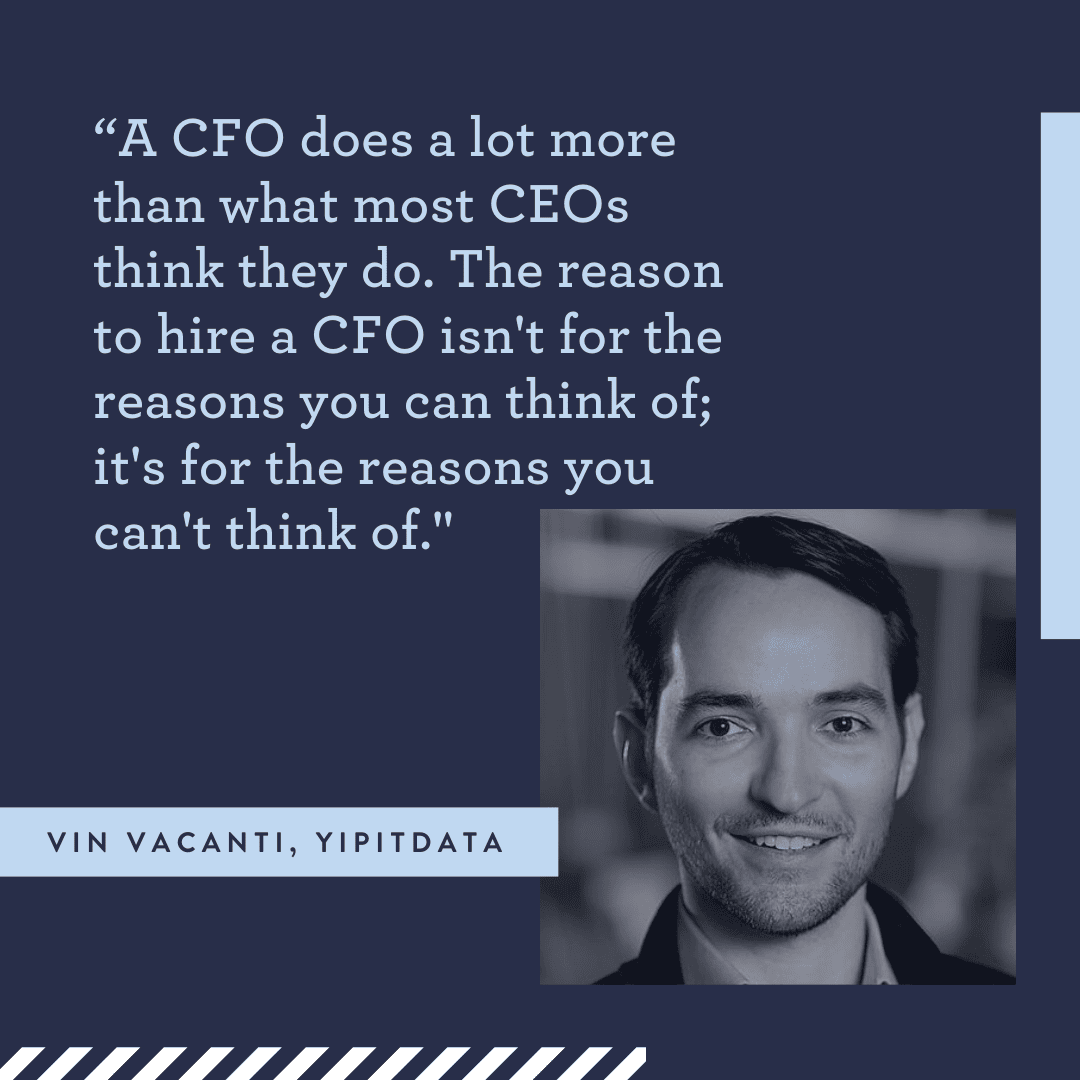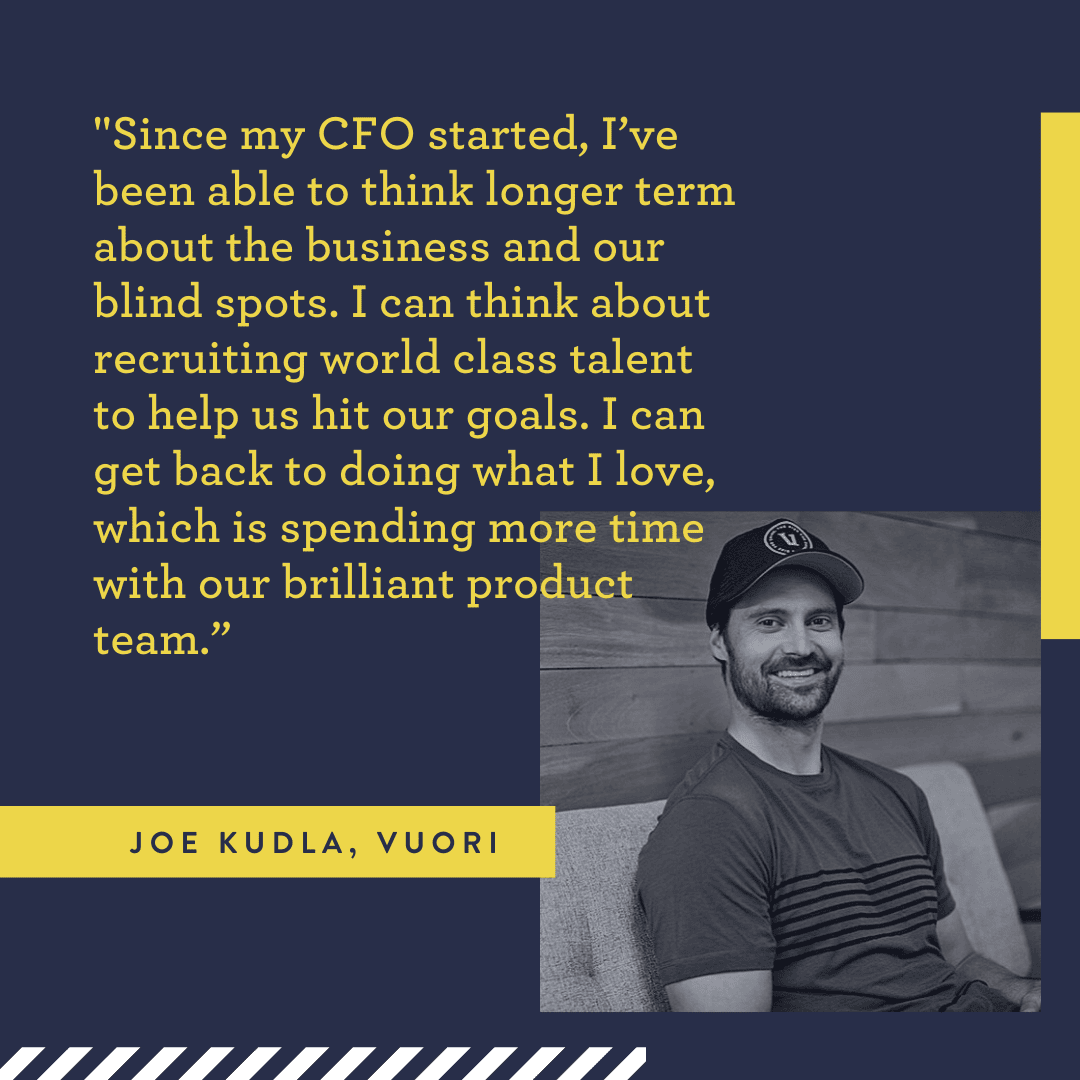Most companies that are starting out rightfully focus on building great products and expanding their market share. Yet at a certain stage, it becomes critical to build out the internal operational infrastructure to ensure scalable growth. A key component of this infrastructure is finance. A mature CFO and finance team provide valuable levers for a growing business to manage current operations (including cash flow and other operational metrics) and plan for the future.
Two of the most common questions we receive are:
“When do we scale the finance team, and hire a CFO?”
“How do we search for and evaluate the candidate who is right for the job?”
We recently spoke with Vin Vacanti at YipitData and Joe Kudla at Vuori, two of our CEOs who both successfully scaled their teams and appointed CFOs over the last year.
YipitData and Vuori: Success Stories
YipitData and Vuori are both founder-run businesses that Norwest partnered with in 2019. These two CEOs had profitably grown their respective businesses to $20M+ in revenue. Given their financially rigorous backgrounds (Vin as a former investment banker and private equity investor, Joe as a former accountant), they opted to serve as “part-time CFO” in addition to CEO within their organizations. It should come as no surprise that prior to partnering with Norwest, they both harbored healthy skepticism about the value of a full-time CFO.
“In the early days, what you need is a controller: somebody who is going to file your taxes, make sure the audit goes well, prepare the monthly financial statements, help you with the FP&A analysis,” said Vin. “But I don’t think most companies can really justify a CFO for something like this.”
Joe agreed: “Prior to serious scaling, someone has to manage cash flow, and someone has to be responsible for raising capital. But usually, the CEO can manage that, with the help of a controller or bookkeeper. A fractional CFO could be a great option, especially if an enterprise lacks the skill set to deeply understand a set of financial statements. But early on, a true CFO is likely to be overkill.”
Growth Acceleration and Challenges
“As you start to scale, truly understanding the economic engine of your business is a challenge.”
Since partnering with Norwest, both YipitData and Vuori have experienced tremendous growth acceleration (2x+ historical growth rates). As each company scaled, Vin and Joe began feeling increasingly stretched to manage both long-term strategy and day-to-day operations without a senior finance leader who could not only close the books but drive value-added insights and recommendations.
“As you start to scale,” said Joe, “truly understanding the economic engine of your business is a challenge. For example, take my industry: imagine you’re a direct-to-consumer company, and you reach a cost per acquisition (CPA) ceiling where the cost of customer acquisition goes through the roof and growth gets a lot more expensive. You might start looking at growth channels in wholesale and brick and mortar retail. But if you don’t set up your pricing strategy properly, you’re not going to get it right. You’re just not. A good CFO can take this super-complex stuff off the CEO’s plate because they have genuine and targeted proficiency here.”
Vin agrees that scaling is the right moment to bring on a CFO: “Once you reach a certain size as a company, you really start to develop budgets, and you develop investment cases and ROI analysis, and all of those types of things. It’s a tremendous amount of work, coordinating with all the different departments, analyzing the trajectory of the company, the investment case, and in pulling all this off, you need to be realistic, and not automatically optimistic, like a lot of CEOs tend to be!”
Process Optimizations
“You’ve got to have great chemistry with your CFO, you’ll be working very closely together.”
Once Vin and Joe aligned on bringing on CFOs, our Norwest Talent team worked meticulously with the companies to help define the scope, compensation, performance benchmarks, and to provide candidate recommendations from within our network. In both cases, a fairly wide net was cast, with candidates ranging from very experienced CFOs to “up and coming” financial controllers or FP&A specialists who were ready to take the next step in their careers. Given how closely CFOs work with CEOs and executive teams, the searches were highly prioritized and each CEO spent a lot of personal time on the process to gauge personality and cultural fit.
“Talk to a lot of people,” advised Joe. “It’s such an important role. You’ve got to have great chemistry with your CFO, you’ll be working very closely together. And so my advice is to invest the time and energy that it takes to conduct the search properly.”
“Make sure to use your network,” said Vin. “We sent an email to 500+ people saying we were hiring for the role. Also, look up CFOs of existing companies of your size and in your broad sector on LinkedIn and see where they were before taking that job and that’s a good place for you to focus your outbound efforts.”
As an investment team, we were actively involved, especially in the later stages of the search process. As a team that has collectively sat on dozens of boards and worked with many different types of executives, we were able to share viewpoints on candidate competency and growth potential and tap into backchannel references.
Value and Lessons Learned
In reflecting on their experiences, Vin and Joe agreed that a CFO was not previously necessary during the initial growth of their businesses, but drove significant incremental value at the point they were brought on. Beyond helping to take key operational items off their plates, both CFOs helped uncover previously unknown insights that drove the businesses to the next level.
“A CFO does a lot more than what most CEOs think they do,” said Vin. “The reason to hire a CFO isn’t for the reasons you can think of; it’s for the reasons you can’t think of. A CFO is going to be able to come in and do new kinds of analyses and ask the right questions such as does your engagement model need to be adjusted? Is your pricing off? Do you have certain customers that are not actually contributing to your business’ profitability?”

“You don’t know what you don’t know,” Joe said. “A CFO will shine a light on your blind spots. I thought because I had a pretty good understanding of where we were going from a cash flow standpoint, that I was doing the CFO job. But the reality is that truly managing that strategic planning, elevating that strategic planning process, is a way bigger job.”
Vin and Joe are extremely capable executives, but both also acknowledged that hiring CFOs earlier would have been very valuable.
“We can all lie to ourselves and think that we have the bandwidth to do it all,” said Joe. “But if you can get the right CFO, they can free up so much of your time. Since my CFO started, I’ve been able to think longer-term about the business and our blind spots. I can think about recruiting world-class talent to help us hit our goals. I can get back to doing what I love, which is spending more time with our brilliant product team.”

Vin agreed, “As the CEO, you often skimp on hiring the skills that you feel you already possess. But in retrospect, I should’ve brought in a CFO earlier. The reality is, I actually spent a lot of my time on the FP&A side of things. My time could have been spent more wisely.”
Here on the growth equity team at Norwest, our focus is on partnering with profitably growing, often founder-managed businesses. We understand that every company has unique challenges, but we are excited to share our best practices in scaling organizations to maximize efficient growth and we look forward to speaking with you soon.






